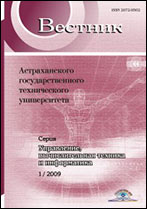|
This article is cited in 1 scientific paper (total in 1 paper)
COMPUTER SOFTWARE AND COMPUTING EQUIPMENT
Design of object oriented software to multi-agent modeling of enterprise processes
A. V. Zatonsky, V. N. Ufimtceva
Berezniki branch of Perm
National Research Polytechnic University
Abstract:
The article focuses on the problem of jointly control of titanium sponge recovery and
magnesium electrolysis stages. Analysis of operational process of segments of electrolysis and reduction
of spongy titanium is made; it helps to determine systemic links and to investigate methods
of joint control over them. The shortcomings of traditional simulation systems have been stated as
applied to this task. A set of C++ classes is created to obtain possibility of designing simulation
systems (and, potentially, multi-agent and active systems) of industrial processes that differ in
absence of structurally pre-determined links between objects and complex algorithms of action and
interaction of objects. Links between objects occur in the course of model developing, so the set
can flexibly change. Technically, classes of all model objects are inherited from one base class,
which allows to properly arrange their calling from a simulated time step function. Modelling time
step is achieved by $\Delta t$ method, i.e. when special states are accounted after termination of a certain
time segment. A unified time step function is cyclically going over all objects, until their state stops
changing. Depth of inquiry is set a-priori. A check of created modeling tool made by solving a task
with the known solution has been made. A model of elementary queuing system cell based on the
class set has been developed. Comparison of the simulation results with results of a similar cell in
GPSS. The correspondence of simulation results is shown. The problem of the necessary inquiry
depth of objects using time step function has been investigated.
Keywords:
titanium sponge, production, control, simulation modeling.
Received: 21.05.2018
Citation:
A. V. Zatonsky, V. N. Ufimtceva, “Design of object oriented software to multi-agent modeling of enterprise processes”, Vestn. Astrakhan State Technical Univ. Ser. Management, Computer Sciences and Informatics, 2018, no. 4, 56–62
Linking options:
https://www.mathnet.ru/eng/vagtu555 https://www.mathnet.ru/eng/vagtu/y2018/i4/p56
|

|




 Contact us:
Contact us: Terms of Use
Terms of Use
 Registration to the website
Registration to the website Logotypes
Logotypes








 Citation in format
Citation in format 
